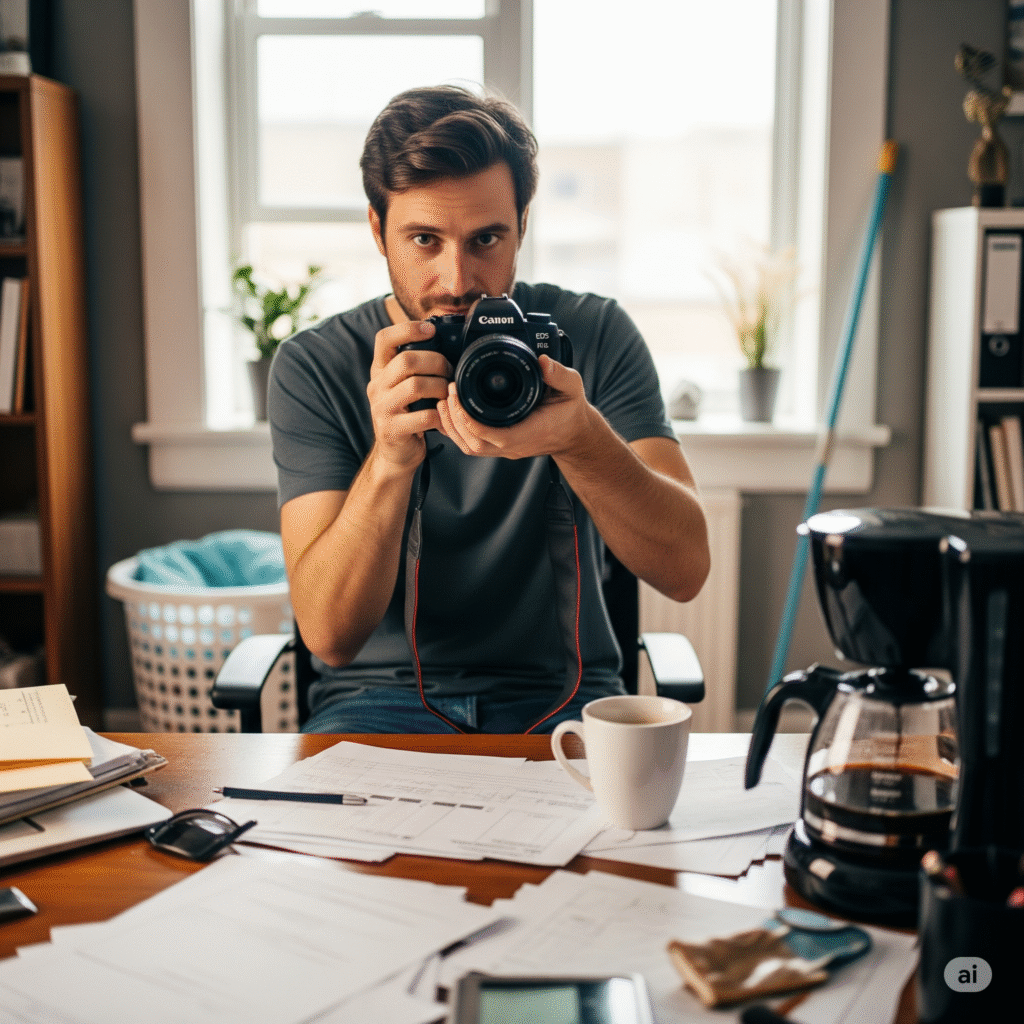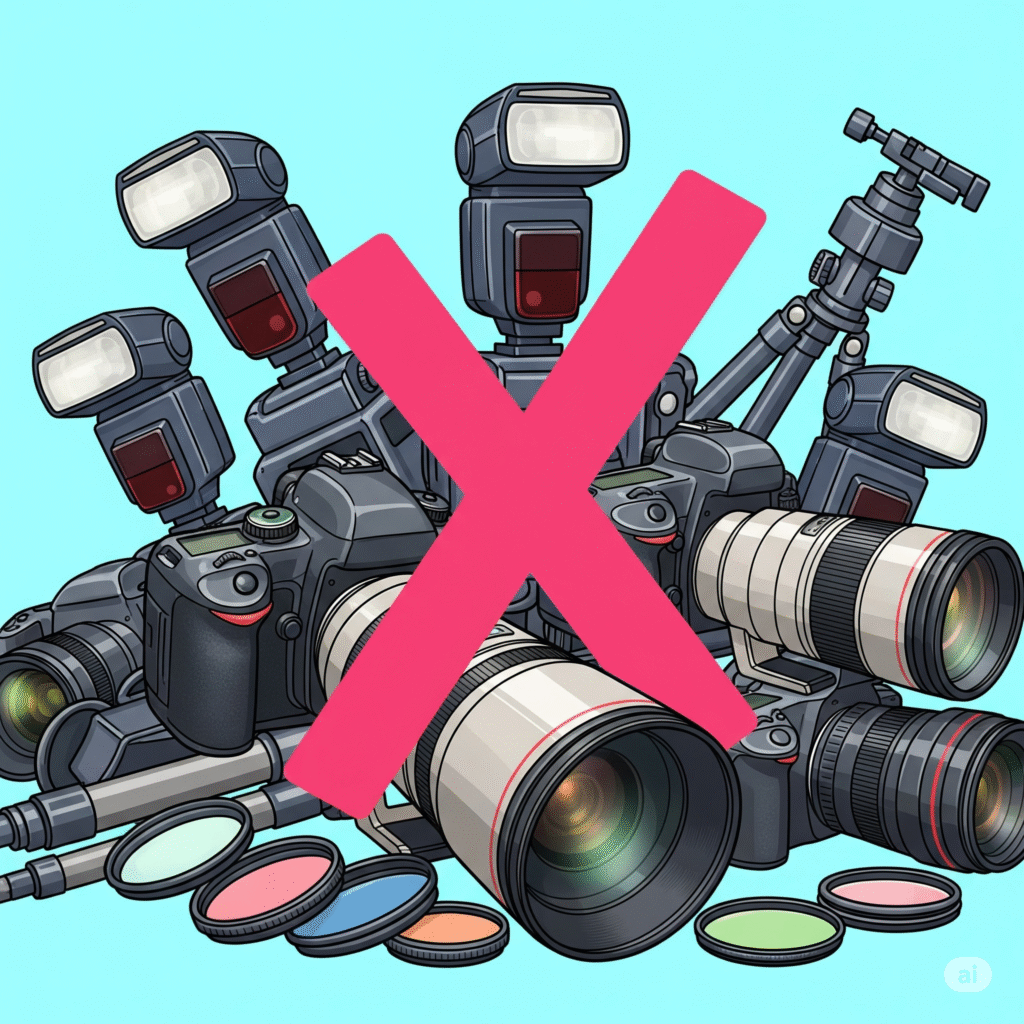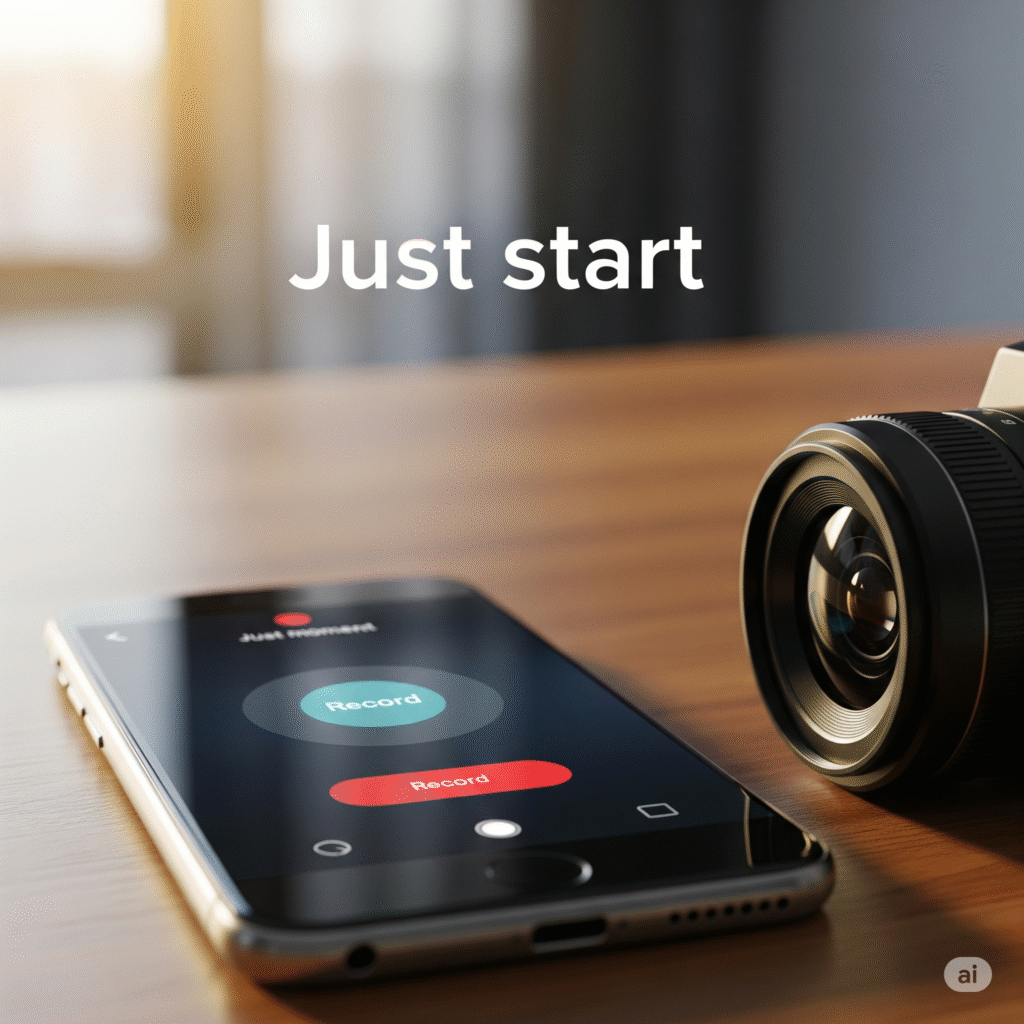The Unfiltered Truth: Why Your "Boring" Life Is Your Greatest Story
Have you ever felt that nagging desire to document your life, to capture the fleeting moments and profound lessons of your daily existence, but found yourself paralyzed by doubt? You’re not alone. The idea of starting can feel overwhelming, especially with the misconception that every moment needs to be a cinematic masterpiece. But what if the greatest story you could ever tell is already unfolding in your seemingly ‘boring’ routine?
In this post, we’ll dive into the unfiltered truth about why documenting your life, in its simplest form, is a powerful catalyst for personal growth and genuine connection.
I’ve been interested in others sharing their lives on YouTube for years, always wanting to take that step myself. While I only truly committed to journaling at the beginning of this year, that quiet space for reflection laid the groundwork. Then, on June 9th, I took the leap. I started recording my life, daily, with no exceptions, setting myself a 365-day challenge: record every single day and ideally upload every day (if I miss a day, I can pack multiple into one, but the recording must be daily).
To lower that initial friction and overcome my shyness about being obvious, I even snagged a tiny, thumb-sized Insta360 Go 3S when it went on sale—a sign, I thought, to finally get started!
This isn’t about becoming a social media influencer overnight, or even about creating perfect “content.” It’s about understanding the profound, often hidden, benefits of simply observing, capturing, and reflecting on your own unique journey. It’s about giving yourself permission to be seen, by yourself first, and then, perhaps, by the world.
My Two-Week Revelation: The Power of Simply Showing Up
When I first picked up my tiny camera two weeks ago, I felt awkward, self-conscious, and unsure what to say. Every mundane task seemed too insignificant to record, every thought too fleeting to articulate. I questioned why anyone, even I, would care about watching me make my bed or walk my dog. The internal critic was loud, whispering, “This is boring. You’re not good enough. What’s the point?”
But I kept going. I committed to capturing snippets, talking directly to the lens as if it were a trusted friend. And what happened was nothing short of a revelation.
Even though I started editing some footage, my laptop quickly gave up on the task—a clear sign it was time for an upgrade (if you’re curious about my tech journey, you might want to check out my newsletter!). So, even without fully finished videos, the act of consistent recording began to transform my internal landscape:
The Unexpected Benefits I Discovered
Thought Organization & Clarity: It forced me to articulate my thoughts, bringing order to the swirling chaos in my head. Things I merely felt or vaguely considered in my mind gained structure and clarity when I spoke them aloud.
Progress Tracking & Error Identification: By simply reviewing my raw footage (sometimes just a few days later), I could see patterns in my behavior, identify recurring thought loops, and spot areas where I was making progress or repeating mistakes. It was like having a personal, objective coach.
Enhanced Self-Awareness: I became acutely aware of my habits, my expressions, my speech patterns. It wasn’t about judgment, but about pure observation, leading to a deeper understanding of myself.
Building Confidence in Speaking Up: That initial shyness talking to the camera slowly began to fade. It was a safe space to practice expressing myself without external pressure, which has already started translating into more confidence in real-life conversations.
This shift from silent journaling to vocal, visual documentation added an entirely new dimension to self-reflection. It’s one thing to write “I felt overwhelmed today.” It’s another to see and hear yourself expressing that feeling, and then observe how you moved through it. If I gained all this just by pressing record for myself, imagine what’s possible for you.

Debunking the Perfection Trap: Authenticity is Your Superpower
One of the biggest obstacles people face when considering documenting their lives, especially through video, is the pervasive myth that it needs to be perfect. You envision professional lighting, flawless editing, and a captivating narrative, and then quickly conclude, “I can’t do that.”
This is the biggest lie holding you back.
The truth is, your most powerful asset isn’t fancy equipment or a polished script; it’s your authenticity. In a world saturated with curated highlight reels, there’s a growing hunger for genuine, unfiltered experiences. People don’t connect with perfection; they connect with realness, vulnerability, and shared humanity.
Think about the content creators who resonate most with you. Often, it’s not the ones with the biggest budgets, but the ones who feel most like a friend, sharing their everyday lives, their struggles, and their triumphs with honesty. The focus has shifted from product to process, from curated art to genuine story.
If you’re looking for inspiration on this topic, I highly recommend checking out these thoughtful videos that explore similar themes about starting your documentation journey and why it matters:
The Unexpected Gifts of Documentation: Beyond the Screen
So, beyond the initial awkwardness, what are the profound benefits awaiting you when you start documenting your life?
1. Supercharge Your Self-Awareness & Personal Growth
Clarity of Thought & Problem Solving: Articulating your thoughts, whether to a camera or on paper, forces you to structure them. This process helps you dissect problems, understand motivations, and find solutions. It’s a form of active meditation that clears mental clutter.
Emotional Intelligence: Documenting your emotional landscape allows you to identify triggers, patterns, and coping mechanisms. Research consistently shows that expressive writing and journaling can reduce stress, anxiety, and symptoms of depression, leading to improved overall psychological well-being. By engaging with your feelings through documentation, you develop a deeper understanding of yourself, enhancing your emotional intelligence.
Memory Preservation & Reflection: Our memories are fleeting and often unreliable. Documenting creates an external archive, a personal “time capsule.” This allows you to revisit moments, learn from past experiences, and appreciate how far you’ve come. It fosters a sense of gratitude for your journey.
2. Unlock Your Voice and Confidence
Improved Communication Skills: Regular recording or writing helps you practice articulating your thoughts and feelings. This not only clarifies your own understanding but also builds your ability to communicate effectively with others. You learn to speak more confidently, coherently, and authentically.
Overcoming Shyness & Fear of Expression: My personal struggle with talking to the camera, especially around others, is common. But with consistent practice, that fear diminishes. It becomes less about “performing” and more about simply being. This newfound comfort in self-expression can ripple into all areas of your life, making you more confident in meetings, social settings, and personal relationships.
Embracing Vulnerability as Strength: The act of making yourself vulnerable, even if only to yourself at first, builds inner strength. When you eventually choose to share with others, that vulnerability transforms into a powerful connection point, showing courage and fostering trust.
3. Forge Deeper Connections & Community
Relatability: Your “boring” life might be someone else’s current reality or past struggle. When you share authentically, others see themselves in your experiences. This relatability is a magnetic force.
Opening New Opportunities: By putting your thoughts and experiences out there, you create an open invitation for others to connect. This can lead to new friendships, collaborations, mentorships, or unexpected opportunities to learn and grow together. You become part of a larger conversation.
Collective Growth: We are much more capable when we collaborate and learn from each other. Your documentation can serve as inspiration, a teaching tool, or simply a reminder to someone that they are not alone.

Addressing Your Doubts: Overcoming the “What Ifs”
It’s natural to have doubts. Let’s tackle some of the most common ones head-on:
“My life is too boring to document.”
The Truth: What you perceive as mundane, others might find incredibly relatable, insightful, or even comforting. Think about popular vloggers like Natalie Lynn, or even the early days of German YouTubers like Unge, Dner, and Julien Bam, which were my absolute favorites back when I was a kid. They often shared their daily lives, simple thoughts, and everyday struggles. These weren’t elaborate productions, but for millions of viewers, they weren’t boring at all. They offered a window into a shared human experience, making viewers feel less alone and providing a sense of connection. Your “boring” life is unique to you, and that uniqueness is its power.
“Isn’t this just for attention?”
The Truth: While some forms of online sharing can be driven by external validation, the core purpose of documenting your life (as we’re discussing it here) is personal growth and connection. The initial benefits are entirely internal—self-reflection, clarity, skill development. If you choose to share, it becomes an act of contribution and community building, not just self-promotion. It’s about empowering yourself and others, not seeking superficial praise.
“It takes away from living in the moment.”
The Truth: This is a very real challenge, and one I’ve wrestled with even in my first two weeks. I’ve had conversations with my partner where she felt a bit taken out of the moment by me reaching for the camera to capture our fun. This highlighted for me the delicate balance between documenting and fully immersing yourself. The key is mindful integration, not constant filming. A quick snippet, a few notes, or a voice memo can be done consciously. The act of choosing what to document can actually make you more present and observant. And later reflection enhances the memory, giving it deeper meaning, rather than detracting from the original experience. It’s about anchoring your memories, not escaping them.
“It requires too much technical skill/expensive equipment.”
The Truth: Absolutely not. While I did invest in a small Insta360 Go 3S to lower my personal barrier, my first weeks could have easily been filmed with my smartphone. It’s more than capable enough to record in good quality, and often, it’s the device you already have in your pocket. I sometimes forgot my dedicated camera at home and still grabbed my phone to capture moments. For journaling, a simple pen and paper are all you need. Don’t let perceived technical barriers be an excuse. Start with what you have, and skills will develop as you go.
“It’s too late to start / The market is saturated.”
The Truth: The beauty of documenting your life for personal growth is that it’s never too late, and it doesn’t matter how many others are doing it. Your unique voice and perspective are yours alone. Authenticity always finds an audience, whether it’s an audience of one (yourself) or thousands. Focus on the internal benefits, and any external reach will be a bonus.

Your First Step Starts Now: A Simple Invitation
So, if you’ve felt that quiet nudge, that longing to capture your story, to understand yourself better, or to simply connect with others on a deeper level, there’s no better time than right now. Not tomorrow, not next week—NOW.
You don’t need a perfectly laid-out plan, an expensive camera, or a sudden burst of courage. You just need to start.
Here’s your invitation to begin:
1. Grab Your Phone (or a Pen): That’s it. Your smartphone’s camera is powerful enough. Or simply open a new document or grab a physical notebook.
2. Record (or Write) Just 60 Seconds: Don’t overthink it. Talk about your day, a thought you had, something you learned, or just how you’re feeling. Or write a few sentences about your morning coffee. The goal is consistency, not perfection.
3. Embrace the Messy Middle: Your first few attempts will feel awkward. That’s normal. Keep going. The discomfort is where the growth happens. Remember, the goal is to share, to be vulnerable, and to grow—not to produce art.
4. Experiment with Format: Maybe video isn’t for you yet. Try audio journaling. Or simply take one photo a day and write a short caption. Find what feels most natural.

Conclusion: The Unwritten Chapters
My 365-day challenge is just beginning, but these first weeks of unedited recording have already given me more clarity and confidence than I anticipated. The journey is far from over, but the path feels clearer. I’m still learning to navigate the shyness, especially with others around, and finding that crucial balance between living and documenting. But I’m certain that with each passing day, I’ll see the camera less as an intimidating device and more as an extension of my voice and my desire to connect.
Your story is worth telling. Every single moment, every thought, every small victory and quiet struggle. When you start documenting your life, you’re not just creating a record; you’re actively engaging with your own narrative, shaping your future self, and opening doors for connection you can’t yet imagine.
So, what are you waiting for? Start today, and watch what unfolds.
Did you enjoy this post?
Click on a star to rate it!
Newsletter
Would you like to learn with me? Subscribe to my monthly newsletter!Recent Posts
- Automation Engineering: From Manual Processes to Intelligent Workflows November 16, 2025
- Reclaim Your Day: How an Extra Morning Hour Can Transform Your Work Life & Mental Clarity October 13, 2025
- Simplify Life with n8n: No-Code Automation for Peak Productivity September 30, 2025
- From Dreams to Reality: How Vibe Coding Transforms My Micro-SaaS Journey August 28, 2025
- Rethinking Work and Life: My Journey Through The 4-Hour Workweek August 11, 2025
In This Post: